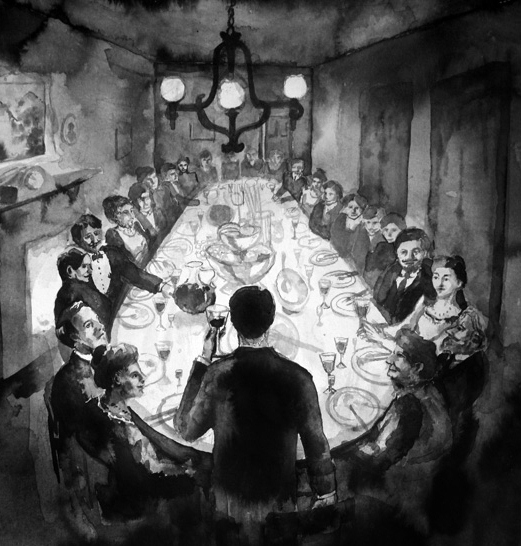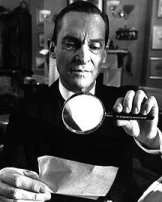A Perfect Day for Bananafish
 Friday, January 18, 2008 at 11:40
Friday, January 18, 2008 at 11:40 "You're badly sunburned? Didn't you use that jar of Bronze I put in your bag? I put it right —"
"I used it. I'm burned anyway."
"That's terrible. Where are you burned?"
"All over, dear, all over."
"That's terrible."
"I'll live."
Considering that the name of this story's protagonist is a homophone of “see more glass,” and the young girl Sybil on the beach has quite a history behind her name, it would make sense to analyze the name of Seymour's wife, Muriel. In Hebrew, my research tells me, Muriel means the myrrh of God (as in one of the gifts from the Magi), which is appropriate. But in Gaelic it is even better: it means the open sea itself.

The story has two perfect halves, then a small postscript. The first half has Muriel speaking on the phone to her mother. Her mother, like all mothers who give a damn, is worried about her. More specifically, she's worried about whether Muriel should have waited out the war for her fiancé, now husband to return. This husband, a fluttering and empty creature we only meet in the story's second half, has been doing strange things since his discharge. Apparently he's rammed a car into a tree, tried something fishy with the chair of Muriel's grandmother and said disconcerting things about her plans for death, insisted that Muriel read a book of German poetry, although she cannot read German, and otherwise behaved with no regard for society, its mores, and how normal, unshellshocked people go about their day. Muriel's mother understands all this, and sees it as rightly tragic. But maybe Seymour should not have been released from the military hospital (her mother calls this "a perfect crime") in the first place. He is, after all, as fragile as glass.
We find this fragile Mr. Glass on the beach, where you can also find this strange phenomenon. He is approached by a little girl whom he has befriended, and when she first addresses him, he lets "a sausaged towel fall away from his eyes." He himself is no longer much older than Sybil, although he has seen more horror than she could ever think possible. He takes Sybil to the ocean with a floating toy and proceeds to talk to her about bananafish, fantastic creatures who lead "a very tragic life":
They're very ordinary-looking fish when they swim in. But once then get in, they behave like pigs. Why, I've known some bananafish to swim into a bananahole and eat as many as seventy-eight bananas.
Some might see a sexual connotation here, especially since Sybil's mother refers to her by a playful children's name that also happens to be a naughty adult word and Seymour kisses her foot at the end of their playtime (perhaps the same foot used when Sybil "stopp[ed] only to sink a foot in a soggy, collapsed castle," a line that this author calls one of the best he has ever read). But Seymour kisses her because she is innocent, and he is not. He kisses innocence because he can make up stories like a child, he can shun responsibility and tact like a child, but his childhood is lost forever under a heap of bombs and bones, and he will never recover. Those bananafish are young men, and they become pigs when they are told to go kill other young men. Upon their return from battle a general might ask them whether they are in good health, whether they used the protection that the army gave them. They did, but they became pigs nonetheless, roasted pigs burnt all over.
An allegory of war chock full of signs and symbols is easy enough, yet Salinger actually goes a step further: it is an allegory of an allegory. Soldiers, some barely out of their teens, return to their civilian lives and become little boys again without the one trait that always distinguishes a child from an adult, innocence. What would a fallen child be like? What would he say and do? How can a child not be innocent? Perhaps he "won't take his bathrobe off"; perhaps he will pretend to remember the number of tigers in a children's tale (as children love to pretend to know something they don't), the same number of bananafish that Sybil supposedly espies (as children love to imitate and one–up). So when Seymour finally does remove his robe he is as pale as Muriel is burnt, and then we realize he is not pale but empty. An unfilled vessel that can never regain its color. And the color would be yellow, the color of Sybil's swimsuit and the color of the fish Seymour makes up to compete with her yellow swimsuit, just like any child would.
The postscript reflects both perfect halves: Muriel, the sea, the scent of God, eternity, peace, and love that survived a war; and Seymour, glass crunched into sand particles and scattered onto a beach with millions more who have died for nothing or who have gone on living while already dead. And when Seymour tells the woman in the elevator that he notices she's been looking at his feet (the part of Sybil he kisses in celebration of her innocence), we know that his own feet have walked through fields of abject destruction. And we also know that bananafish, like all fish, have no feet.






